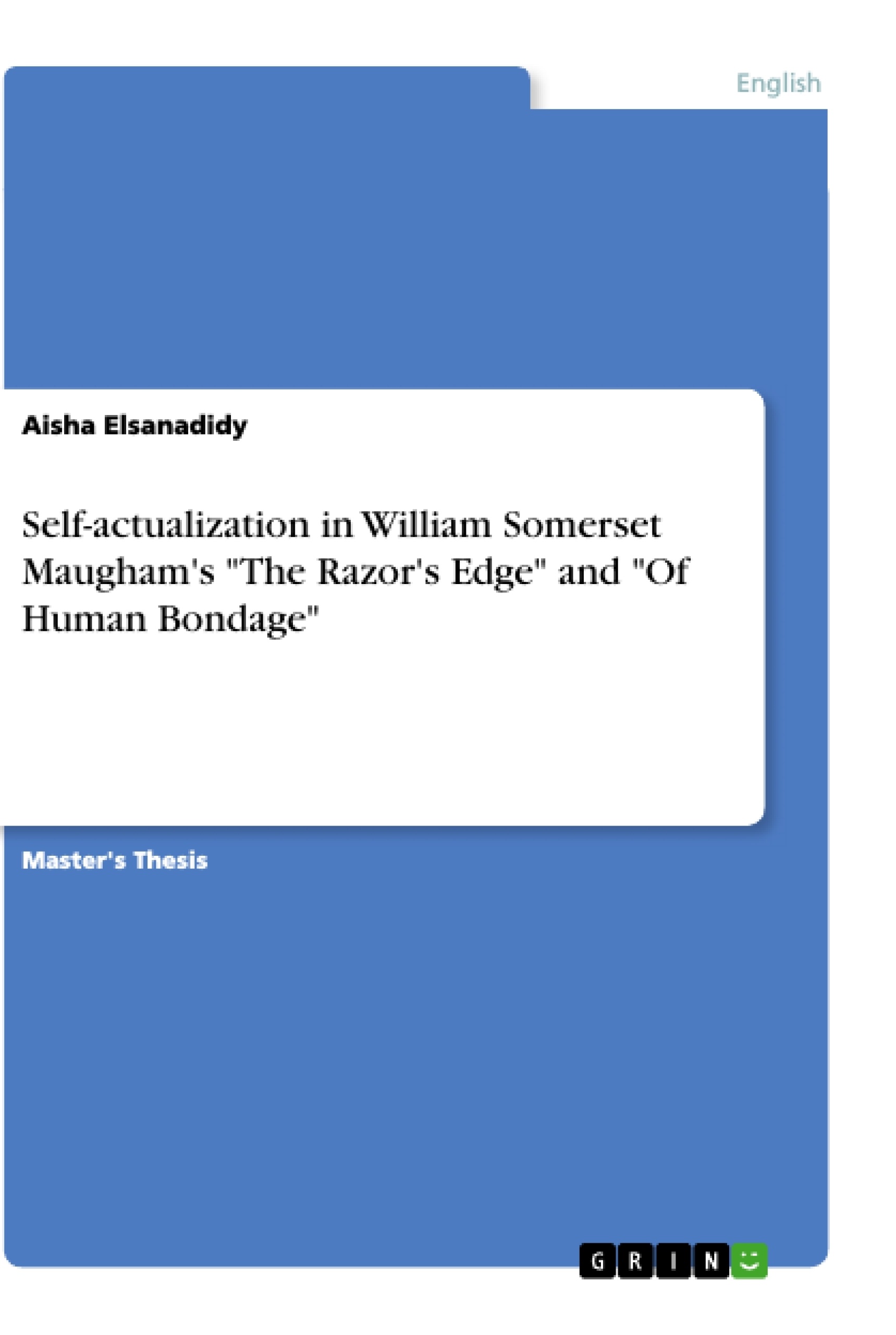The main objective of this thesis is to examine William Somerset Maugham’s "The Razor’s Edge" and "Of Human Bondage" through Maslow’s Theory of Psychology. It tackles the aspects of the Third Force Psychology and its positive sides. It focuses on illustrating the strong relation between literature and psychology because they are inseparable and interdependent. Moreover, it reveals the needs of the characters of the two novels through Maslow’s Hierarchy of Needs. The study also illustrates that man desires and craves satisfying all of the basic needs in order to reach the highest level of self-actualization. Finally, it shows that there are some characteristics of self-actualized people that distinguish them from ordinary ones. It shows how self-actualized people are distinguished, successful and admired. Subsequently, it is interested in explaining how these qualities are applicable to the two protagonists.
Inhaltsverzeichnis (Table of Contents)
- Abstract
- Introduction
- Chapter One: The Intersection of the Theory of the Third Force Psychology and Literature
- Chapter Two: Maslow's Hierarchy of Needs and its Application to Maugham's The Razor's Edge and Of Human Bondage
- Chapter Three: The Characteristics of Self-actualized People in Maugham's Two Novels: The Razor's Edge and Of Human Bondage
- Conclusion
Zielsetzung und Themenschwerpunkte (Objectives and Key Themes)
This thesis examines the application of the theory of the third force psychology, specifically Maslow's Hierarchy of Needs, to the works of W. Somerset Maugham, focusing on his novels The Razor's Edge and Of Human Bondage.
- Exploring the intersection of psychology and literature
- Analyzing Maslow's Hierarchy of Needs and its relevance to the characters in Maugham's novels
- Identifying the characteristics of self-actualized individuals in Maugham's works
- Investigating the psychological and philosophical themes present in The Razor's Edge and Of Human Bondage
- Examining the relationship between human needs, personal growth, and self-realization.
Zusammenfassung der Kapitel (Chapter Summaries)
Chapter One introduces the concept of the Third Force Psychology and its key theorists, particularly focusing on Abraham Maslow. It establishes the theoretical framework for examining the psychological aspects of literature, particularly Maslow's Hierarchy of Needs. Chapter Two explores the application of Maslow's Hierarchy of Needs to Maugham's The Razor's Edge and Of Human Bondage. It analyzes the characters' journeys through different stages of needs and their striving for self-actualization. Chapter Three delves deeper into the characteristics of self-actualized individuals as portrayed in Maugham's novels, examining the qualities and behaviors exhibited by characters who have reached the pinnacle of human potential. The analysis of these characters' experiences provides insight into the complex interplay of needs, motivation, and personal growth.
Schlüsselwörter (Keywords)
The thesis focuses on key concepts such as Third Force Psychology, Maslow's Hierarchy of Needs, self-actualization, human motivation, psychological themes in literature, character analysis, and W. Somerset Maugham.
Frequently Asked Questions
Which novels by W. Somerset Maugham are analyzed in this thesis?
The thesis focuses on "The Razor's Edge" and "Of Human Bondage."
How is Maslow's Hierarchy of Needs used in the study?
The study applies Maslow's theory to identify the characters' needs and their journey toward the highest level of personal growth: self-actualization.
What is "Third Force Psychology"?
It is a psychological perspective, represented by figures like Maslow, that emphasizes positive human potential and self-realization rather than just pathology.
What are the characteristics of self-actualized people according to the thesis?
The thesis identifies specific qualities such as being distinguished, successful, and admired, and examines how these apply to the protagonists of Maugham's novels.
Does the study show a link between literature and psychology?
Yes, the thesis argues that literature and psychology are inseparable and interdependent, as literature provides a rich ground for exploring human motivation and needs.
- Quote paper
- Aisha Elsanadidy (Author), 2020, Self-actualization in William Somerset Maugham's "The Razor's Edge" and "Of Human Bondage", Munich, GRIN Verlag, https://www.grin.com/document/947928



